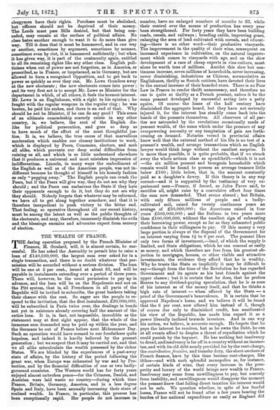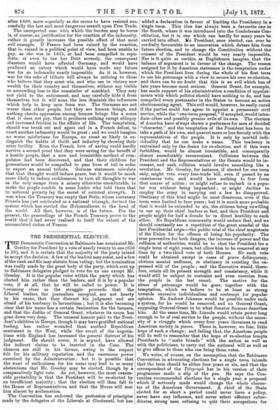THE WEALTH OF FRANCE.
THE daring operation proposed by the French Minister of Finance, M. Goulard, will, it is almost certain, be suc-
cessful. He has asked the Assembly to permit him to raise a loan of £140,000,000, the largest sum ever asked for in a single transaction, and there is no doubt whatever that per- mission will be accorded without a serious division. The loan will be one at 5 per cent., issued at about 83, and will be payable in instalments extending over a period of three years. There will, however, be the usual permission to pay up in advance, and the loan will be on the Napoleonic and not on the Pitt system, that is, all Frenchmen in all parts of the Republic will be invited to subscribe, the great bankers taking their chance with the rest. So eager are the people to re- spond to the invitation, that the first instalment, £20,000,000, will be subscribed in Paris twice over, the dealings in bonds not yet in existence already covering half the amount of the entire loan. It is, in fact, not impossible, incredible as the statement may at first sight appear, that the whole of the immense sum demanded may be paid up within the year, and the Germans be out of France before next Midsummer Day. Such an operation would have seemed to our forefathers quite hopeless, and indeed it is hardly believed by the present generation ; but we suspect that it may be carried out, and that we all alike miscalculate the wealth possessed by the richer States. We are blinded by the experiences of a past-away state of affairs, by the history of the period following the great war, when Europe was exhausted by war and by Pro- tection, and by the financial difficulties of one or two badly- governed countries. The Western world has for forty years enjoyed almost unbroken peace—for the Crimean, Danish, and Austrian wars laid waste no country—during which time France, Britain, Germany, America, and in a less degree Spain and Italy, have been annually increasing their store of realised wealth. In France, in particular, this process has been exceptionally rapid. Her people do not increase in number, have no enlarged numbers of mouths to fill, while their control over the means of production has every year been strengthened. For forty years they have been building roads, canals, and railways ; breeding cattle, improving grass, enlarging the area of land cultivated with cereals, and educat- ing—there is no other word—their productive vineyards. The improvement in the quality of their wine, consequent on increased experience in cultivation, on the natural improve- ment which comes to vineyards with age, and on the slow development of a race of cheap experts in vine-culture, must alone be worth tens of millions. Amidst this slow but con- tinuous increase, seven millions of households, never increasing, never diminishing, industrious as Chinese, accumulative as Englishmen, thrifty as Scotch cottiers, have devoted their lives to the annual increase of their hoarded store. There is no Poor Law in France to render thrift unnecessary, and therefore no one is quite so thrifty as a French peasant, unless it be the same peasant developed by successful saving into a petty squire. Of course the loans of the half century have diminished the aggregate hoard, but they have not seriously injured it, for the interest has steadily come back into the hands of the peasants themselves. All observers of all par- ties are astounded by the revelations occasionally made of peasant wealth, of the sums which under the pressure of any overpowering necessity or any temptation of gain are forth- coming on demand. Notaries versed in provincial affairs know well that the external method of his life is no test of a peasant's wealth, and arrange transactions which an English lawyer would think large without the smallest surprise. It is more than possible, it is quite probable, that if we struck away the whole artisan class as spendthrift—which it is not —the six million peasant and bourgeois households which remain would be found to possess an average treasure little below £100; little below, that is, the amount constantly paid as a daughter's dowry. If this theory is in any way correct—and it is supported by the testimony of very ex- perienced men—France, if forced, as Jules Favre said, to sacrifice all, might raise by a convulsive effort four times the sum now demanded. That seems absurd ; but Britain, with only fifteen millions of people and a badly- cultivated soil, raised for twenty continuous years an average of £30,000,000; the Americans raised in four years £500,000,000; and the Italians in two years more than £100,000,000, without the smallest sign of exhausting their borrowing power, except so far as they exhausted public confidence in their willingness to pay. Of this money a very large portion is always at the disposal of the Government for an interest varying from 4 to 6 per cent. The peasant likes only two forms of investment,—land, of which the supply is limited, and State obligations, which he can conceal as easily as money, and which therefore are free from his greatest ob- jection to mortgages, houses, or other visible and attractive investments, the evidence they afford that he is wealthy. Why he trusts the State so implicitly it may be difficult to say—though from the time of the Revolution he has regarded Government and its agents as his best friends against the upper classes ; but it is certain that he does, that he prefers Rentes to any dividend-paying speculation, that he is as sure of his interest as of the money itself, and that he thinks a high rate of interest — when offered by the State — a proof of the Government's benevolence. It is certain that he approved Napoleon's loans, and we believe it will be found that the 6 per cent. now offered him instead of 5, though of course due only to diminished credit, has ameliorated his view of the Republic, has made him regard it as a power liberally inclined towards investors. And in one way his notion, we believe, is accurate enough. He forgets that he pays the interest he receives, but as he owns the Debt, he can at all events afford to despise a threat of repudiation which he could punish by the bayonet. He has nothing but insolvency to dread, and insolvency is far off in a country without an income- tax, and with its old debt nearly provided for by the rent-charge, the contribution foncare, and transfer duty, the sheet-anchors of French finance, have by this time become rent-charges, like tithes—and with such splendid monopolies as, for instance, of certain kinds of wine, that every increase in the pros- perity and luxury of the world brings new wealth to France. Insolvency may come from unwillingness to pay, but scarcely from inability, and unwillingness would disappear the moment the peasant knew that failing direct taxation his interest would not be safe. We question whether, in spite of her fearful losses, France will not be found after a few years bearing the burden of her national expenditure as easily as England did cessfully the last and most dangerous assault upon Free Trade.
The unexpected ease with which the burden may be borne is, of course, no justification for the exaction of the indemnity, rather it greatly increases the possible effect of that most evil example. If France had been ruined by the exaction, that is, ruined in a political point of view, had been unable to pay, as she was in 1815, or had been compelled to repu- diate, or even to tax her Debt severely, the consequent disasters would have affected Germany, and would have produced an outcry which would have made any future war for an indemnity nearly impossible. As it is, however, war for the sake of tribute will always be enticing to those who believe that they must win, and who see in victory new wealth for their country and themselves, without any visible or astounding loss to the remainder of mankind. They may not yield to the enticement, and may carefully hide it from themselves, but it will none the less diminish the influences which help to keep men from war. The Germans are not worse than other people, but they are human beings, and nothing checks oppression among human beings like a sense that it does not pay, that it produces nothing except obloquy and increased friction in the affairs of life. The temptation, should war break out and again end in a French defeat, to exact another indemnity would be great ; and we could imagine no worse misfortune for Europe, no event so likely to ex- tinguish the habits of thrift and industry by showing their utter futility. Even the French love of saving could hardly survive a second proof that they were saving for the benefit of a hostile people, that a new and irresistible method of com- pulsion had been discovered, and that their children for generations would be compelled to pass lives of toil in order to export an annual tribute. German statesmen calculate that that thought would induce peace, but it would be much more likely to induce recklessness, to turn all thoughts to war as the only escape from a misery otherwise unendurable, to make the people confide in some leader who told them that in national poverty lay the secret of national strength. It was when the Treasury was empty that Stein, whose centenary Prussia has just celebrated as a national triumph, devised the system which has carried the Hohenzollerns to the head of the world. All that, however, is of the future. For the present, the proceedings of the French Treasury prove to the world that it had never realised to itself the extent of the accumulated riches of France.



































 Previous page
Previous page